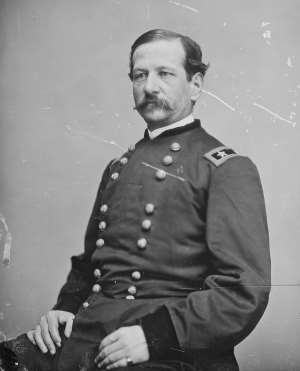From previous marker continue on Grandview Road, across Blue River Road, to 98th Terr.; marker 21 is 25 yards to the left. This marker is located at the intersection of Grandview Road and 98th Terrace.
New Santa Fe Road Historical Marker
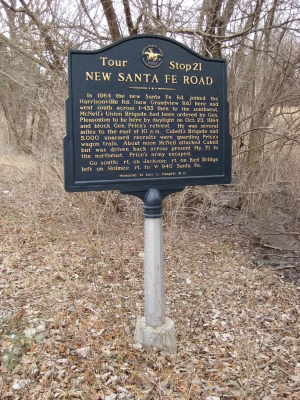
New Santa Fe Road Historical Marker Inscription
"In 1864, the New Santa Fe Road joined the Harrisonville Road (now Grandview Road) here and went south across present I-435, then to the southwest. McNeil's Union Brigade had been ordered by General Pleasonton to be here by daylight on October 23, 1864 and block General Price's retreat. He was several miles to the east by 10:00 A.M. Cabell's Brigade and 5,000 unarmed recruits were guarding Price's wagon train. About noon McNeil attacked Cabell but was driven back across present Hwy. 71 to the northeast. Price's army escaped."
As discussed at the previous marker, Maj. Gen. Sterling Price's wagon train was heading for New Santa Fe, guarded by Brig. Gen. William L. Cabell's Brigade and several thousand unarmed recruits under the command of Col. Charles H. Tyler. When Cabell saw enemy cavalry off to the northeast he notified Price the wagon train was in danger. Price arrived with his escort around 10:00 a.m. Price described the events in his official report.
Being at that time near Westport, and in full view of Generals Fagan and Shelby and their commands, I received information that my train, which was in front and on the right of the Fort Scott road, was threatened by the enemy, some 2,000 or 2,500 strong, who were moving on a line parallel to the Fort Scott road. I immediately sent the information to Major-General Fagan and Brigadier-General Shelby, and directed them to fall back to the train as soon as they could do so with safety, which I would attempt to defend until they arrived. I immediately pushed forward to the front of the train with my escort.
Maj. Gen. Alfred Pleasonton sent Brig. Gen. John McNeil's 2d Cavalry Brigade down the Santa Fe Trail to cut off Price's retreat. McNeil described what happened with his command in his official report.
I moved at 12 o'clock that night under orders to march to the junction of the Independence with the Little Santa Fe road ... by order commanding general. At 4 a.m. October 23 I flanked a large camp on the opposite side of the Blue, and near the Byram's Ford. I ascertained it to be the enemy. I sent a detachment of the Second Missouri Cavalry (Merrill's Horse) to the ford. Halted to feed horses, having marched two days and nearly two nights included without forage. At daybreak a heavy firing commenced on my right and in the direction of Westport. I moved on toward Hickman Mills, expecting to be able to strike Price's flank, moving cautiously about four miles, firing having ceased for some time, when suddenly I found myself in contact with the entire force of the enemy. I at once formed my brigade in line, advanced my skirmishers, and opened on their column with a section of Captain Montgomery's battery (3-inch Rodman rifles). The enemy had formed their line of three lines deep and actually surrounded me on three sides. My skirmishers (Seventh Kansas and Merrill's Horse) most gallantly pressed up to the main line of the enemy's center. In the meantime he had placed batteries in three different locations and opened a well-directed crossfire upon Montgomery; I was consequently compelled to move him some 400 yards to the left recall my skirmish line, and occupy the new position. I determined to hold this position at all hazards, in hopes that the remaining brigades would come up. Toward night the enemy retired, leaving about 40 of their dead on the ground.
And so McNeil was late arriving at his destination. Brig. Gen. William L. Cabell described the events in his official report.
Our wagon train had been ordered on the Fort Scott road—Cabell's Brigade was guarding the train with Tyler's small Brigade in front. Fagan, with two of his Arkansas Brigades with Marmaduke and Shelby attacked the enemy near West Port. I moved to the crossing of the [Big] Blue and started the train. A heavy column of the enemy, under McNeil, was on our left rear. I moved with my Brigade between the train and this column and attacked them with a heavy line of skirmishers and drove them back at least one mile. In the meantime stragglers and unarmed men were coming in from the three Divisions who were fighting near West Port. I ordered the train to move on rapidly and not to stop, and made every man fall into line as fast as they came up. The grass being very tall and the wind high and blowing towards the enemy, I concluded to set the grass on fire and to follow immediately behind the blaze with a line of skirmishers who were ordered to keep up a brisk Are through the flames. The fire leaping through the high grass directly towards the enemy resulted, as I hoped, as it drove McNeil and his column back several miles. This enabled me to get the train and my own command so far that, they could not overtake us. We encamped on a fork of Grand River.
Price was clever—deploying Cabell's Brigade as skirmishers and forming the thousands of unarmed recruits into line of battle. McNeil was fooled by Price's actions. Had he attacked, McNeil, who outnumbered Cabell's troopers, may have been able to overwhelm the Confederates and scatter the wagons and the unarmed men. Pleasonton was furious that McNeil had not been able to carry out his orders.
The night previous, at Independence, I had ordered General McNeil to proceed with his brigade from that point to Little Santa Fé, and to reach that latter point by daylight. General McNeil failed to obey this order, but came up to the Big Blue, some five or six miles above the point at which the rest of the division was fighting, about 12 m. on the 23d, and instead of vigorously attacking the enemy's wagon train, which was directly in front of him with but little escort, he contented himself with some skirmishing and cannonading, and the train escaped. The rebel General Marmaduke stated after he was captured that had McNeil attacked at this time they would have lost their whole train. I trust that this conduct on the part of General McNeil will meet the marked disapprobation of the major-general commanding, as it has mine.
Maj. Gen. Sterling Price
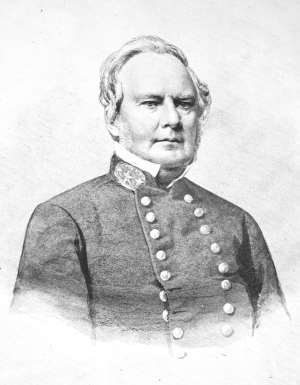
Brig. Gen. William L. Cabell
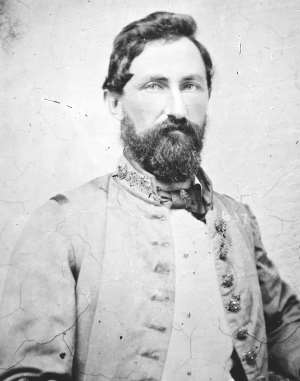
Brig. Gen. John McNeil
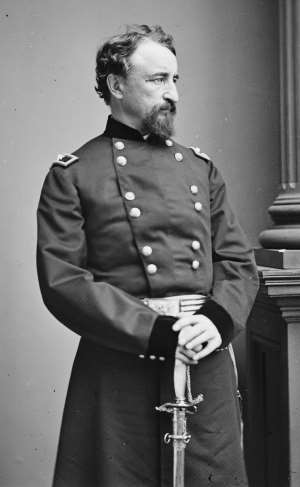
Maj. Gen. Alfred Pleasonton
